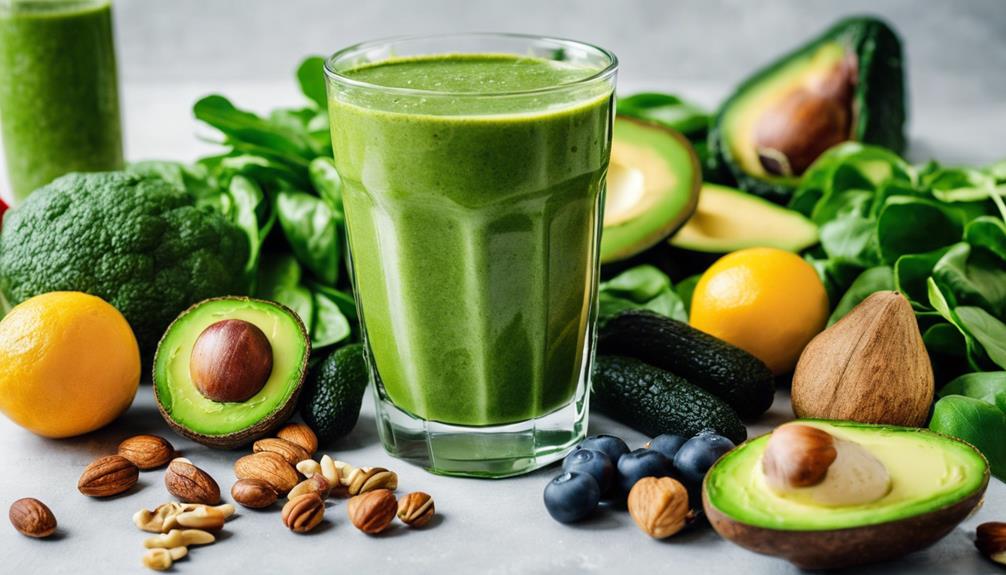How Can I Increase My Testosterone Levels Naturally?
If you feel like your inner fire needs a boost, think of your testosterone levels as the flames that keep it burning.
But what can you do when those flames start to flicker and fade?
There are natural ways to stoke that fire within you, from simple lifestyle changes to incorporating specific habits that can make a difference.
Let's explore how you can reignite your vitality by focusing on the small but impactful adjustments you can make in your daily routine.
Key Takeaways
- Optimize diet with zinc-rich foods and healthy fats
- Engage in resistance training for testosterone production
- Prioritize sleep, stress management, and sunlight exposure
- Consider herbal supplements, limit alcohol, and avoid disruptors
Diet and Testosterone
To naturally increase your testosterone levels, optimizing your diet is crucial. Hormone balance plays a significant role in maintaining testosterone levels. Including foods rich in zinc, such as oysters, beef, and pumpkin seeds, can help support healthy testosterone production.
Additionally, consuming sufficient healthy fats like those found in avocados, nuts, and olive oil is essential for hormone synthesis. Vitamin D, often called the sunshine vitamin, is also vital for testosterone production. Fatty fish, cheese, and egg yolks are good dietary sources of vitamin D.
Nutritional supplements can also aid in optimizing testosterone levels. Research suggests that supplements like D-aspartic acid, fenugreek extract, and ashwagandha may help support healthy testosterone levels. However, it's crucial to consult with a healthcare provider before incorporating supplements into your diet to ensure they're suitable for you.
Exercise and Testosterone
Optimizing your exercise routine plays a crucial role in naturally boosting testosterone levels. Hormone regulation is heavily influenced by physical activity.
Engaging in regular exercise, especially resistance training such as weightlifting, has been shown to have a positive impact on testosterone levels. When you work out, your body releases endorphins and growth hormone, both of which play a role in hormone regulation.
Additionally, exercise helps in muscle building. As you challenge your muscles through strength training, it triggers the production of testosterone to aid in muscle repair and growth. Compound exercises like squats, deadlifts, and bench presses are particularly effective in boosting testosterone levels.
Aim for a balanced workout routine that includes both cardiovascular exercises and strength training to optimize hormone production. Remember, consistency is key when it comes to reaping the benefits of exercise on testosterone levels.
Sleep and Testosterone
Ensuring adequate sleep is a critical factor in maintaining optimal testosterone levels naturally. Research has shown that sleep plays a vital role in hormone regulation, including testosterone production. Lack of sleep can disrupt the body's hormonal balance, leading to decreased testosterone levels. Additionally, insufficient sleep can affect the body's ability to recover and repair itself, further impacting testosterone production.
When it comes to supplement effects on testosterone levels, sleep shouldn't be overlooked. Some studies suggest that certain supplements, when combined with adequate sleep, may help support healthy testosterone levels. For example, supplements like vitamin D and zinc have been linked to promoting testosterone production, but their effectiveness can be influenced by sleep quality.
Incorporating good sleep hygiene practices, such as maintaining a consistent sleep schedule, creating a relaxing bedtime routine, and ensuring a comfortable sleep environment, can positively impact hormone regulation and support optimal testosterone levels naturally. Prioritizing sleep alongside proper nutrition and exercise is key to maximizing your body's testosterone production.
Stress Management
A crucial aspect of maintaining healthy testosterone levels naturally involves effectively managing stress, which can significantly impact hormone regulation and overall well-being. Chronic stress can lead to increased cortisol levels, which in turn can interfere with testosterone production.
To combat this, incorporating mindfulness practices into your daily routine can be beneficial. Mindfulness involves focusing on the present moment without judgment, which can help reduce stress and promote hormone balance. Additionally, relaxation techniques such as deep breathing exercises, progressive muscle relaxation, or yoga can help lower cortisol levels and alleviate stress.
Making time for activities that bring you joy and relaxation, like spending time in nature, listening to music, or practicing hobbies, can also contribute to stress reduction and improved testosterone levels. By prioritizing stress management through mindfulness practice and relaxation techniques, you can support your body's natural hormone production and overall well-being.
Sunlight Exposure
To naturally boost your testosterone levels, consider exposing yourself to adequate sunlight regularly. Sunlight exposure plays a crucial role in testosterone production due to its impact on vitamin D levels in the body. Vitamin D deficiency has been linked to lower testosterone levels, so ensuring you get enough sunlight can help maintain optimal hormone regulation.
Research suggests that spending time outdoors engaging in activities like walking, jogging, or playing sports not only increases your exposure to sunlight but also has a positive effect on testosterone levels. Aim for around 15-30 minutes of sunlight exposure a few times a week to help support your body's natural testosterone production.
Additionally, sunlight exposure has been shown to have other health benefits beyond testosterone production, such as improving mood and supporting overall well-being. So, make it a habit to get outside regularly, especially during the sunnier months, to maximize the benefits of sunlight on your hormone levels and overall health.
Weight Management
To naturally increase testosterone levels, you must pay attention to your weight management. Research suggests that excess body fat can lead to lower testosterone levels.
Exercise for Testosterone
Engage in regular physical activity to optimize your weight management and naturally boost testosterone levels. Exercise plays a crucial role in hormone regulation and muscle building, which are essential for maintaining healthy testosterone levels.
Here are some effective exercises to consider:
- Strength Training: Incorporate weightlifting or bodyweight exercises to build muscle mass and increase testosterone production.
- High-Intensity Interval Training (HIIT): HIIT workouts are great for burning fat, improving cardiovascular health, and boosting testosterone levels.
- Compound Movements: Focus on exercises like squats, deadlifts, and bench presses that engage multiple muscle groups simultaneously, stimulating testosterone release.
- Cardiovascular Exercise: Include aerobic activities like running or cycling to enhance overall fitness and support optimal hormone balance.
Diet Impact on Levels
Optimizing your dietary choices plays a pivotal role in managing weight effectively and influencing testosterone levels naturally. When it comes to hormone balance, maintaining a healthy weight is essential. Excess body fat, especially around the abdomen, can lead to hormonal imbalances, including lower testosterone levels.
Focusing on a balanced diet rich in nutrients like lean proteins, fruits, vegetables, and whole grains can support your weight management goals and contribute to hormonal health. Additionally, certain foods like cruciferous vegetables, nuts, seeds, and foods high in omega-3 fatty acids can provide nutritional support for optimal hormone production.
Sleep and Hormones
Improving your sleep quality is crucial for maintaining healthy hormone levels, particularly for effective weight management. Adequate sleep helps improve recovery and hormone balance, which are essential for optimizing testosterone levels naturally.
Here are some key points to consider:
- Consistent Sleep Schedule: Aim for 7-9 hours of quality sleep each night.
- Dark and Cool Environment: Create a sleep-conducive environment to enhance restorative sleep.
- Limit Screen Time: Minimize exposure to screens before bedtime to promote melatonin production.
- Stress Management: Practice relaxation techniques to reduce stress levels, aiding in better sleep quality and hormone regulation.
Herbal Supplements
To naturally boost testosterone levels, incorporating specific herbal supplements into your daily routine can be beneficial. Herbal supplements can help support hormone balance and provide energy boosters that may aid in enhancing testosterone production. One popular herbal supplement is ashwagandha, known for its potential to reduce cortisol levels, which can inhibit testosterone production. Another herb, Tribulus terrestris, is believed to increase testosterone levels by stimulating the release of luteinizing hormone, which signals the body to produce more testosterone. Fenugreek is another herb that may help boost testosterone levels and improve libido.
Additionally, ginger extract has been studied for its potential to increase testosterone levels and improve sperm health. DHEA, though technically a hormone produced by the body, is sometimes used as a supplement to help boost testosterone levels. While these herbal supplements may offer some benefits, it's essential to consult with a healthcare provider before adding them to your routine, especially if you have any underlying health conditions or are taking medications that could interact with these supplements.
Limit Alcohol Consumption
Cutting back on alcohol consumption is crucial for maintaining healthy testosterone levels and overall well-being. Excessive alcohol intake can negatively impact hormone regulation and liver health, both of which are essential for optimal testosterone levels. Here are four reasons why limiting alcohol is beneficial:
- Hormone Regulation: Alcohol consumption can disrupt the delicate balance of hormones in your body, including testosterone. High alcohol intake may lead to decreased testosterone production, affecting muscle mass, energy levels, and libido.
- Liver Health: The liver plays a vital role in metabolizing hormones, including testosterone. Excessive alcohol can damage the liver, leading to impaired function and potentially reducing testosterone levels.
- Calorie Control: Alcoholic beverages are often high in empty calories, which can contribute to weight gain and obesity. Excess body fat can lower testosterone levels, so cutting back on alcohol can help manage weight and support hormone balance.
- Sleep Quality: Alcohol consumption can disrupt sleep patterns, leading to decreased testosterone production. Improved sleep quality, which comes with reduced alcohol intake, is essential for maintaining optimal hormone levels.
Avoid Endocrine Disruptors
To naturally increase your testosterone levels, it's essential to steer clear of endocrine disruptors. Identify harmful chemicals in household products and opt for organic alternatives to minimize exposure.
Additionally, reducing the use of plastic items can help lower your contact with these disruptive compounds.
Identify Harmful Chemicals
Identify harmful chemicals in everyday products to avoid endocrine disruptors that can negatively impact testosterone levels. Some common chemicals to watch out for include:
- Phthalates: Found in plastics, personal care products, and some food packaging, these chemicals can interfere with hormone regulation.
- Bisphenol A (BPA): Present in plastic containers, BPA can disrupt the endocrine system and affect testosterone levels.
- Parabens: Widely used as preservatives in cosmetics and personal care items, parabens can mimic estrogen and disrupt hormonal balance.
- Perfluorinated Chemicals (PFCs): Often found in non-stick cookware and stain-resistant materials, PFCs can interfere with testosterone production and regulation.
Choose Organic Products
To safeguard your hormonal balance and optimize testosterone levels, prioritize selecting organic products free from endocrine disruptors like phthalates, BPA, parabens, and perfluorinated chemicals. Choosing organic products can benefit your hormone balance by reducing your exposure to these harmful chemicals commonly found in non-organic items. Organic products are grown without synthetic pesticides or genetically modified organisms (GMOs), making them a healthier choice for both your body and the environment. By opting for organic options, you can lower your intake of endocrine disruptors, which may interfere with hormone production and regulation, including testosterone. Below is a table highlighting the differences between organic and non-organic products:
| Organic Products | Non-Organic Products |
|---|---|
| No synthetic pesticides | Contains synthetic pesticides |
| Non-GMO | May contain GMOs |
| Environmentally friendly | Environmental impact from pesticides |
| Free from endocrine disruptors | May contain endocrine disruptors |
Reduce Plastic Usage
How can reducing your plastic usage help you avoid exposure to endocrine disruptors that may impact your hormone balance and testosterone levels?
Decreasing plastic usage isn't only beneficial for the environment but also for your health. Here's how it can help:
- Reduce Pollution: By cutting down on plastic use, you contribute to lower pollution levels in the environment, reducing the risk of endocrine disruptors entering your body.
- Avoid Endocrine Disruptors: Plastics contain chemicals like BPA and phthalates, which are known to interfere with hormone function and may affect testosterone levels.
- Promote Sustainable Living: Embracing a lifestyle with less plastic promotes sustainable living practices that are better for both the planet and your well-being.
- Protect Hormone Balance: Minimizing exposure to plastic can help maintain a healthy hormone balance, supporting optimal testosterone levels.
Conclusion
In conclusion, boosting your testosterone levels naturally is as easy as tweaking your diet, hitting the gym regularly, getting enough sleep, and managing stress effectively.
By incorporating these simple lifestyle changes, you can transform yourself into a testosterone-fueled powerhouse, ready to conquer any challenge that comes your way.
So what're you waiting for? Start implementing these tips today and watch your testosterone levels skyrocket to new heights!







